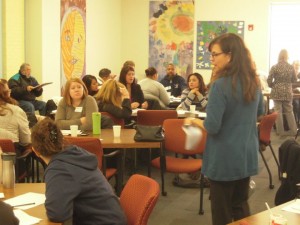Financial literacy programs are becoming mandatory in many districts as more young people fall into financial traps in high school and college, credit card jargon gets harder to decipher, and debt becomes an American trait. If students aren’t involved in a program through their school or their community, organizations like Young Americans are creating awareness and providing tools on their website to get students and their parents involved in becoming financially literate for their family’s future. Don’t think your child wants to know more? According to a 2006 back-to-school survey by Capitol One, it might not be as difficult as you think to get your child or students excited to learn more about their finances.
- 49% of teens are eager to learn more about money management, but only 14% have taken a class on the topic and 35% would like to learn from their parents. When asked about the topics they’d most like to learn about, teens express interest in checking accounts, budgeting, investing, saving, and financing for large purchases.
- 79% of parents see themselves as positive money role models for their kids, yet only a small percentage are taking advantage of day-to-day learning opportunities to arm their teens with practical money skills.
- Only 43% of parents have discussed the importance of needs versus wants, compared to 64% who did so last year, and a surprising 42% of parents have not taken any steps whatsoever to discuss financial basics.
- Capital One’s Annual Back to School Survey Finds Teens Eager to Learn about Money, But Parents Continue to Overlook Important Learning Opportunities http://phx.corporate-ir.net/phoenix.zhtml?c=70667&p=irol-newsArticle2&ID=882661&highlight
It’s never too late to get students involved in their financial future. According to Young Americans, you can get children as young as one and as old as twenty-one to open a savings account, teach teens to apply for a loan or a credit card, or get 2nd – 8th graders involved in a financial summer camp, to name a few. The consequences of not preparing youth with financial skills are largely evident in college students and American families.
- The average 21-year-old will spend more that 2.2 million in their lifetime (share-save-spend.com).
- 45% of college students are in credit card debt, the average credit card debt being more than $3,000 (Jump$tart Coalition).
- The number of 18-24-year-olds declaring bankruptcy has increased 96% in 10 years (CARE).
- 50.8% of college-age adults agree with this statement: “I have experienced repeated, unsuccessful attempts to control, cut back or stop excessive money use” (MyVesta).
Understanding finances is still complicating to many adults. If you don’t feel qualified to give financial advice to your child or student, use this as an opportunity to take a financial class, pick up a financial planning book, research on the internet and get involved in your own financial future and security.














